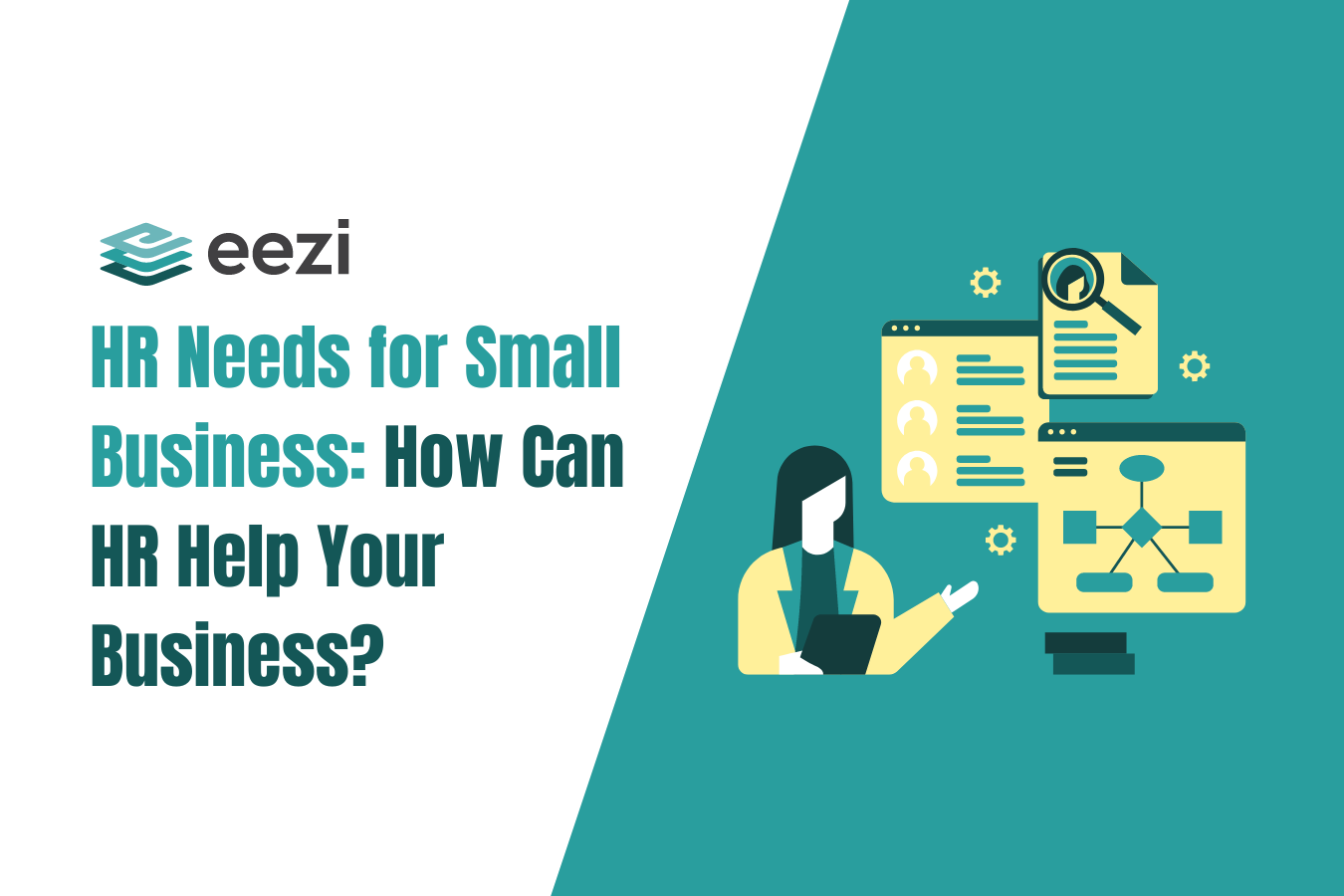What are the main HR needs every small business should have? Here is a list of HR qualities and features every small business must have.

What is a small business?
A small business is a business that is owned by an independent owner. Usually, they employ no more than 500 workers, including management and staff. A small business may have branches in different locations. Furthermore, they usually earn less revenue than larger businesses. Lastly, most small businesses are often associated with service and retail industries.
Small vs. micro businesses
A small business and a micro business may appear similar due to their small scale, but they have key distinctions. A small business typically has a more developed organizational structure and broader operational scope. In contrast, a micro business operates with a maximum of five (5) employees and often begins as a home-based or small office/storefront venture.
Related: HR tips for SMEs
What is HR?
HR stands for human resources. It encompasses the entire workforce of a business, encompassing employees at all levels, volunteers, and contractors who have been part of the company’s workforce.
In the corporate context, “HR” commonly refers to the human resources department. This department plays a critical role within a business, overseeing all matters related to the company’s workforce.
Efficiently managing the company’s human resources is pivotal for its prosperity. To achieve this, it’s essential for the HR manager and team to be well-qualified for their roles, capable of guiding the business towards success.

What is the purpose of a human resource department?
The HR department within a business holds a pivotal role in shaping the organization’s trajectory. A primary focus of their responsibilities is the management of the company’s most precious asset: its employees.
This entails harnessing each employee’s finest skills and abilities. To achieve this, the HR manager and team are deeply engaged in the recruitment and onboarding process, extending their involvement until an employee departs from the company. In essence, the effectiveness of human resource management can significantly influence whether a business prospers or falters.
An HR team usually performs the following HR processes in a company:
Recruitment and onboarding
The HR determines what positions need filling and what qualifications each applicant must possess. In addition, they also administer applicant exams, interviews, and the entire hiring process. Also, part of their task is to ensure the completeness of the requirements that applicants submit.
Onboarding employees includes orientation, where HR discusses the employee’s role in the company. During the orientation, HR also keeps new hires up to date with the company’s policies. The same is true for the HR policies and the discussion and release of the employee handbook.
Employee training
HR’s role in employee training holds immense importance for any company or organization. Training is a necessity to align employee skills with the company’s requirements and ensure they stay abreast of evolving technologies.
While small business owners might perceive training as less critical due to hiring skilled individuals, its significance should not be underestimated. Training enhances employee experience and satisfaction, fostering their growth and engagement. Ultimately, HR-driven training programs contribute to a more skilled, motivated, and connected workforce.
Employee records
All companies collect their employees’ records. The HR team is usually the one who collects these. Some of the pertinent information may include the employees’ medical records and health insurance numbers, social security numbers, and personal and contact information. Furthermore, they also handle employee time records and leaves while they render work in the company.
Employee compensation
HR department handling employee information is only one part of their task. Aside from this, they also manage the computation of each employee’s compensation and coordinate its release. Additionally, they are in charge of making sure their companies pay employees on time and with the right amount.
Employee benefits
The Labor Code of the Philippines, along with republic acts, requires employers to give benefits to their employees. It falls on the HR team to make sure that the employees are receiving these mandatory benefits. Additionally, they ensure the delivery of any other benefits agreed upon in the employees’ contract.
Employee engagement and relations
It can be hard looking for new employees that can perform their job. It is even harder to find ones that fit right into the vision and workflow and quickly adapt to the company culture. That is why ensuring the employees are well-engaged with the company and its goals is very important.
Maintaining good relationships with the employees helps ensure they stay longer with the company. First, it is hard to look for the right people for the job. Second, it creates a bad image for the company to lose its employees often. Lastly, Maintaining employee engagement and good relations is one of the most important HR responsibilities.
Employee performance management and monitoring
The productivity of a company and the quality of its product or service determine its competitiveness in the industry. In relation to this, HR’s role is to monitor the performance of every employee.
Furthermore, they ensure that employees perform to their best abilities or at least to the company’s standards. Lastly, the HR department conducts performance reviews regularly. This determines which employees are performing well and which are slacking off in their duties.
Read More: How to Outsource Payroll in the Philippines?
What are the HR needs for small businesses?

No matter how big or how small businesses are, they will always have needs. And those needs might just be too big for the owner alone to handle. Let us take a closer look at the HR needs of small businesses.
Compliance
One of the important HR matters for small businesses is compliance with laws, regulations, policies, and procedures. These directly affect the business regardless of where it is located. Examples of these include the Labor Code of the Philippines and the various republic acts and executive orders.
In some cases, small business owners take care of legal compliance. This is in addition to business management, including filing taxes and several forms. Compliance with employment laws must not be taken for granted as they may cause big problems later on.
Employee recruitment, onboarding, off-boarding
No matter how small the business, it will always require the hiring of employees to reach its goals. A screening process must be conducted to find the best people fit for the job descriptions.
Once the best applicants have been hired, they must submit the necessary requirements. The HR team then receives these documents for compilation or filing. Until the employee finally leaves the company for good, the employee’s needs and welfare are part of the business’ responsibilities.
Employee training and development
As mentioned before, employee training and development is a must for every small business. Training employees help in their professional development and skills improvement. Additionally, it also helps them engage with the company and encourages them to stay longer.
Payroll and benefits
Another HR need of a small business is taking care of payroll. The accuracy in doing payroll can make or break a business. Payroll must be accurate in incorporating time records, leaves, and other monetary benefits. Payroll also includes withholding necessary taxes and mandatory contributions, which are all part of a business’ legal obligation.
Employee records management
The employee’s records contain very important and even sensitive information. That is why it must be managed and secured properly. Employee records contain their salary grade, time records, filed leaves, personal information, medical records, and other pertinent information and documents.
The solutions…
A small business owner might get overwhelmed by the bulk and extent of the HR functions. Furthermore, some of the paperwork and functions might find these business owners out of their depth. Without the right tools and knowledge, errors that can jeopardize the business’s success are likely to occur.
Hire external HR professionals
One of the possible solutions to this problem is to hire an external HR professional. External HR professionals are hr specialists who are not part of the business or company. They specialize in hiring their services to perform HR functions and duties for other companies. All of these things were done without actually formally becoming employees of the company. Here are some of the types of HR professionals:

HR manager
The HR manager’s role is to oversee the other employees of the HR department. They are also responsible for updating policies to match current conditions and comply with existing laws. The HR manager also takes point in creating development plans.
HR Generalist
An HR generalist is a specialist who is well-versed in most of the functions of the HR department and the policies of the company. They are tasked to manage the daily activities and transactions of the department.
Employment Specialist
Employment specialists deal with the employment needs of the company. They are in charge of job postings, matching job candidates to the most fitting roles in the company. Their knowledge of the company’s screening and hiring process, job descriptions, benefits offered, and salaries are in-depth and wide.
Compensation and benefits specialist
This type of HR specialist focuses on employee salary and benefits offered by the company. They are in charge of processing pay raises and promotions. Lastly, they are also in charge of disseminating information regarding changes in benefits offered by the company.
Development Specialist
A Development Specialist concentrates on training employees to ensure that they have the skill set necessary to perform their jobs well and to help in their personal growth and professional development.
Employee Relations Specialist
An Employee Relations Specialist is in charge of working with all employees, including managers and employers to maintain a smooth working relationship in the company.
Outsource to a third party.
Another solution is to outsource the HR functions to a third-party organization, like a Professional Employment Organization (PEO). PEOs play the part of the employer in the employee-employer contract. The PEO handles everything from the employment process to managing payroll, withholding taxes, employee benefits, labor law compliance, and HR paperwork. Outsourcing to a third party certainly relieves the burden of performing difficult HR tasks and saves time. However, third-party organizations might just be a bit heavy on the budget for small businesses.
Create an HR team or department.
The above-mentioned solutions to HR problems certainly have their merits, but nothing beats having an HR team that is part of the business exclusively. A business’ own HR team or HR department is specifically catered to working and processing the data of the employees and of the company itself. They have the best in-depth knowledge of the company’s policies and the conditions it is currently in. To create the company’s very own HR department, here are some steps to follow:

Assess the situation and create the HR processes
The first step to creating the best HR team for your company is to assess the current situation your company is in, HR-wise. Look at the necessary HR functions and see if your company is currently performing them. Based on your assessment, create the HR processes that your company needs.
Establish the HR team structure.
The next step to creating your HR team is to define the HR team structure. This step helps establish what your HR team needs and specific areas each member must have a specialty. Lastly, this helps determine how many members must comprise the team, and so forth.
Fill skill gaps through recruitment.
Once the structure of the HR team has been established, it becomes clear what skills the members of the HR team must possess. Most often, it is necessary to recruit more people who possess the necessary skill set to complete the HR team and help lead the company to success.
Establish the HR KPIs
Key Performance Indicators or KPIs are vital to measuring the efficacy of the HR team. HR KPIs are used for the performance reviews of the HR team. Additionally, it helps in assessing how they are achieving the goals of the company.
KPIs include employee turnover rate, training costs, and employee productivity and satisfaction. More specifically, these are numbers like employee tardiness and absenteeism and employee promotion rates.
Set the HR budget allotment.
Another important step in creating the HR team is to set the budget allotment that the HR team gets to work with. Based on this budget, the HR team can accurately set achievable goals for the team and for the company.
But the best step is…
Choosing the best HR Software
Opting for the right HR software is a pivotal decision that can significantly enhance a small business’s management of essential HR functions. This software acts as a vital support system, elevating the company’s reputation and guiding it towards success by optimizing its offerings.
Selecting the optimal HR software is a critical step in building an effective HR team for your business. In today’s market, there exists a plethora of HR service providers, each offering unique solutions.
To identify the best HR software for your company, it’s essential to assess the specific HR functions your business requires while keeping cost considerations in mind. HR providers like eezi offer comprehensive modules and features that cater to a wide range of HR needs, providing an array of options for your small business’s growth and success.
The best HR software for your company
Worry no more about all the difficult and tedious HR tasks you need to perform to a T to remain legally compliant and competitive in the industry. eezi HR and Payroll software can do all that for you without any computation hiccups and paperwork errors.
Try eezi Cloud-based HR and Payroll software now!



